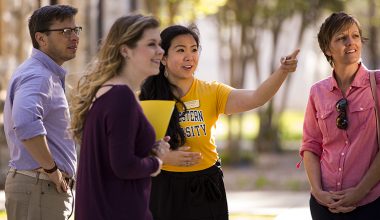Choosing your secondary school is like picking the perfect dress for your prom night from a wardrobe full of some of the most beautiful outfits. It’s a very big decision!
You want something beautiful and bright, that sets you apart, but so are all of them, so you choose one but are wondering what reasons you should choose it out of the rest.
With so many secondary schools out there and so many reasons to choose one, you’re probably wondering about the reasons to put on secondary school applications.
Choosing the right secondary school is an important decision and you can give several good reasons to put on a secondary school application. This application is the next big step to ensure every student applies to the best school they can think of.
From academic aspirations to personal growth and community engagement, there are indeed good reasons that make a compelling case for the thoughtful preparation of these applications. In this post, we’ll cover some of the good reasons to put on secondary school applications.
Table of contents
- When and How Do You Apply to a Secondary School?
- What Should Be in a Secondary School Application?
- Personal Information:
- Academic Records:
- Letters of Recommendation:
- Personal Statement or Essay:
- Extracurricular Activities:
- Achievements and Awards:
- Parent/Guardian Information:
- Interviews or Assessments:
- Financial Information (if applicable):
- Additional Essays or Questions:
- Application Fee:
- Deadlines and Submission Instructions:
- Signature and Consent:
- Good Reasons To Put On Secondary School Applications
- How To Write A Secondary School Application
- Review Application Requirements:
- Gather Necessary Documents:
- Create a Personal Statement or Essay:
- List Extracurricular Activities:
- Prepare a Resume (if requested):
- Request Letters of Recommendation:
- Proofread and Edit:
- Follow the Application Instructions:
- Meet Deadlines:
- Double-Check Everything:
- Submit Your Application:
- Follow Up:
- Can I Highlight My Academic Achievements In A Secondary School Application
- Frequently Asked Questions
- Conclusions
- References
- Recommendations
When and How Do You Apply to a Secondary School?
Choosing your secondary school is an exciting thing to do, but things can get a bit confusing sometimes. That’s why you need to know when and how you can apply for one.
Think of applying to a secondary school as having a very special window of opportunity. A door, if you might! This opportunity is usually open on September 1st of the year. That is usually when the application fun begins in the UK.
Now, applying to a secondary or a high school has a deadline as it does a start date. This deadline usually falls on October 31st of the same year – that is, October 31st of every year. It runs from September 1st to October 31st of every year.
Normally, missing the deadline with leave you with just fewer options of schools to apply to, so, you might begin your application time to avoid the stress.
To apply to a secondary school, first, your primary school will give you a guide to put you through the application process. It usually involves providing you with an application form which they or your guardian will help you fill out.
Then, you will be able to list up to five secondary schools of your choice in most cases – these are secondary schools you’d like to attend.
Now, after you have applied and the deadline has passed, you’ll wait to hear from the schools you applied to. Now, schools will consider your application and preferences and they will notify you that you have been offered a school placement.
Read: What is The Average Class Size of Secondary Schools in the UK?
What Should Be in a Secondary School Application?
A secondary school application is an important document that can greatly influence a student’s educational journey. It serves as an introduction of the student to the school’s admissions committee and provides valuable insights into the applicant’s qualifications, achievements, and potential.
To create a comprehensive secondary school application, several key components should be carefully considered and included:
Personal Information:
At the outset, an application typically includes basic personal information such as the student’s full name, date of birth, contact details, and address. This section ensures that the school can easily identify and reach out to the applicant.
Academic Records:
One of the most important components of a secondary school application is the academic record. This includes transcripts, report cards, and standardized test scores. These documents provide a clear picture of the applicant’s academic performance and potential.
Letters of Recommendation:
Typically, applicants are required to submit letters of recommendation from teachers, mentors, or other individuals who can attest to their character and abilities. These letters offer valuable insights into the applicant’s qualities beyond their academic achievements.
Also read: What is The Average Class Size of Secondary Schools in the UK?
Personal Statement or Essay:
A personal statement or essay is an opportunity for the applicant to express their motivations, goals, and unique qualities. It allows the admissions committee to get to know the applicant on a more personal level and understand what makes them a strong candidate.
Extracurricular Activities:
Many applications include a section where applicants can list their extracurricular activities. This may encompass sports, clubs, community service, or other interests. Demonstrating involvement in a variety of activities can showcase a well-rounded applicant.
Achievements and Awards:
Applicants can highlight any significant achievements or awards they have received, whether in academics, arts, sports, or other areas. These accomplishments can demonstrate dedication and excellence.
Parent/Guardian Information:
Some applications may request information about the applicant’s parents or guardians, including their educational background and occupation. This information can provide context about the applicant’s family background.
Also read: What are Comprehensive And Foundation Schools? How Does It Work?
Interviews or Assessments:
In some cases, secondary schools may require applicants to participate in interviews or assessments as part of the application process. These interactions allow the school to evaluate interpersonal skills and potential fit within the community.
Financial Information (if applicable):
For schools with tuition fees, applicants may need to provide financial information, including details about their family’s income or eligibility for financial aid.
Also read: How To Get into the Best Grammar School? Top 15 on Our List
Additional Essays or Questions:
Some schools include specific essay prompts or questions that applicants must address. These prompts can vary widely and may focus on topics such as educational goals, ethical dilemmas, or personal experiences.
Application Fee:
Most secondary school applications require a fee to cover administrative costs. It’s important to ensure that this fee is paid on time to complete the application process.
Deadlines and Submission Instructions:
Clear information about application deadlines and submission instructions, including whether the application should be submitted online or via mail, is typically included in the application packet.
Signature and Consent:
The application usually concludes with a section where the applicant and their parent or guardian provide their signatures, confirming the accuracy of the information provided and consenting to the application process.
Also read: Do In-State Schools Students Have to Follow a National Curriculum?
Good Reasons To Put On Secondary School Applications
- Strong Academic Record: Highlight your excellent grades, GPA, and academic achievements to demonstrate your commitment to learning.
- Standardized Test Scores: If applicable, provide competitive standardized test scores that showcase your readiness for challenging coursework.
- Passion for Learning: Express your genuine passion for acquiring knowledge and your eagerness to explore new subjects.
- Extracurricular Involvement: Emphasize your active participation in clubs, sports, arts, or other extracurricular activities, which shows your dedication beyond academics.
- Leadership Skills: Highlight any leadership roles you’ve held in school clubs, sports teams, or community organizations.
- Community Service: Discuss your involvement in community service or volunteer work, demonstrating your commitment to making a positive impact.
- Personal Growth: Explain how you’ve overcome challenges or setbacks and how they’ve contributed to your personal growth and resilience.
- Diversity and Inclusion: Illustrate how your background, experiences, or perspectives can enrich the school’s diverse community.
- Passion Projects: Share any personal projects, hobbies, or interests that reflect your creativity and dedication.
- Recommendations: Include strong letters of recommendation from teachers, mentors, or community leaders who can vouch for your character and potential.
- Academic Goals: Discuss your long-term academic goals and how the school’s programs align with your aspirations.
- Alignment with School Values: Explain why you believe the school’s mission, values, and educational approach are the right fit for you.
- Interdisciplinary Interests: Showcase your interest in exploring subjects beyond your core academic interests, indicating a well-rounded approach to learning.
- Innovative Thinking: Highlight any innovative ideas, projects, or solutions you’ve developed, indicating your ability to think critically and creatively.
- Positive Contributions: Express your willingness to contribute positively to the school community, whether through clubs, student government, or volunteering.
How To Write A Secondary School Application
Writing a secondary school application requires careful planning, attention to detail, and the ability to showcase your strengths and qualifications effectively. Here’s a step-by-step guide on how to write a secondary school application:
Review Application Requirements:
Start by carefully reading and understanding the application requirements provided by the school. These requirements may include specific documents, essays, deadlines, and any other relevant instructions.
Gather Necessary Documents:
Collect all the documents you need for your application, such as academic transcripts, standardized test scores, letters of recommendation, and any other requested materials. Ensure that these documents are accurate and up-to-date.
Create a Personal Statement or Essay:
Most secondary school applications require a personal statement or essay. This is your opportunity to express your motivations, goals, and unique qualities.
- Start with a strong introduction that grabs the reader’s attention.
- Highlight your academic interests, achievements, and extracurricular involvement.
- Share personal experiences or challenges that have shaped your character.
- Explain why you’re interested in attending the specific school and how it aligns with your goals.
- Conclude with a memorable statement that reinforces your enthusiasm and suitability for the school.
List Extracurricular Activities:
Complete the section of the application that asks about your extracurricular activities. Be thorough and include any clubs, sports, volunteer work, or hobbies that you’re involved in. Emphasize leadership roles and any notable accomplishments.
Prepare a Resume (if requested):
Some schools may ask for a resume in addition to the application. Create a concise and well-organized resume that highlights your educational background, extracurricular activities, awards, and any relevant experiences.
Also read: When Do Year 13 (Sixth Forms) Finish School?
Request Letters of Recommendation:
Approach teachers, mentors, or other individuals who can provide strong letters of recommendation. Ask for these letters well in advance of the application deadline to give recommenders ample time to write and submit them.
Proofread and Edit:
Review your application, essay, and any other written materials carefully. Check for spelling and grammar errors, and ensure that your writing is clear and concise. Consider seeking feedback from teachers, parents, or mentors.
Follow the Application Instructions:
Pay close attention to any specific instructions for applying. Some schools may require online submission, while others may request a physical copy by mail. Be sure to include all required documents and fees.
Meet Deadlines:
Submit your application well before the deadline to avoid any last-minute issues. Late submissions may not be considered.
Double-Check Everything:
Before submitting your application, double-check that you have included all necessary materials, signed all required forms, and followed all instructions accurately.
Submit Your Application:
Submit your application by the specified deadline through the designated method (online or by mail).
Follow Up:
After submitting your application, you may want to follow up with the school to confirm that they have received all your materials and that your application is complete.
Also, read: What is a Boarding School in the UK and What are its Benefits?
Can I Highlight My Academic Achievements In A Secondary School Application
Highlighting your academic achievements in a secondary school application is not only advisable but often a crucial component of the application process. Admissions committees in secondary schools are interested in assessing an applicant’s academic qualifications and potential. Here’s how you can effectively showcase your academic achievements:
Transcripts and Report Cards:
Include your academic transcripts and report cards that provide a comprehensive overview of your academic performance. Make sure these documents are up-to-date and accurately reflect your grades and coursework.
Standardized Test Scores:
If required, submit standardized test scores such as the SAT or ACT. These scores can provide additional evidence of your academic abilities.
GPA (Grade Point Average):
If your school uses a GPA system, mention your GPA prominently. You can also include information about your class rank if applicable.
Also, read: How to Get a Bursary for a Private School in 2024
Honors and Awards:
Highlight any honors, awards, or scholarships you have received for academic excellence. This could include being on the honor roll, receiving subject-specific awards, or earning a high GPA.
Advanced Courses:
If you’ve taken advanced or honors courses, Advanced Placement (AP), International Baccalaureate (IB), or dual-enrollment college courses, mention them in your application. These courses demonstrate your willingness to challenge yourself academically.
Extracurricular Academic Activities:
If you’ve participated in academic clubs, competitions, or activities outside of regular coursework, be sure to mention them. This can include participation in math clubs, science fairs, debate teams, or other intellectual pursuits.
Academic Goals and Interests:
In your personal statement or essay, you can discuss your academic goals, interests, and why you are enthusiastic about pursuing a challenging academic program at the school you’re applying to. Explain how your achievements thus far align with these goals.
Recommendation Letters:
Request letters of recommendation from teachers who can speak to your academic abilities and work ethic. Their insights can provide valuable context for your achievements.
When highlighting your academic achievements, it’s essential to strike a balance between confidence and humility. Be proud of your accomplishments, but avoid appearing arrogant. Emphasize how your academic achievements have prepared you for success in the secondary school’s academic environment and how you plan to continue excelling academically.
Frequently Asked Questions
A secondary school application is a formal request submitted by a student or their parents/guardians to gain admission to a secondary or high school. It typically includes personal information, academic records, essays, and other materials to help the school assess the applicant’s qualifications.
Grades and academic achievements are essential components of the application. They demonstrate your academic readiness and commitment to learning. However, many schools also consider other factors, such as character, extracurricular involvement, and recommendations.
Many secondary schools require letters of recommendation from teachers or mentors. These letters provide insights into your character, work ethic, and potential for success at the school.
Yes, you can apply to multiple secondary schools simultaneously. Be sure to carefully follow the application requirements and deadlines for each school you’re interested in.
Missing the application deadline can be problematic, but it’s essential to contact the school’s admissions office immediately. Some schools may consider late applications on a case-by-case basis, but it’s not guaranteed.
To stand out, emphasize your unique qualities, experiences, and achievements. Showcase your passion for learning, community involvement, leadership roles, and any special talents or skills you possess. Tailor your application to each school’s values and mission.
If the application fee poses a financial burden, check if the school offers fee waivers or financial assistance. Contact the school’s admissions office to inquire about available options.
Conclusions
The secondary school application process is a critical step in shaping your educational journey. By carefully crafting your application, highlighting your strengths, and presenting a compelling case for your admission, you can increase your chances of gaining entry to the school of your choice.
References
- methemandtheothers.com – Reasons for Choosing a Secondary School: The Factors We’re Considering
- mumsnet.com
- goodschoolsguide.co.uk – Secondary schools – top tips when applying
Recommendations
- What is Summer School in the UK? Definition, Meaning, Purpose, and How it Works
- What is High School Equivalent in the UK?
- What is Difference between Academy and School in the UK?
- IGCSE vs GCSE: Which is Harder and Why?
- The 10 Most Popular GCSE Subjects | Ranking
- Top-rated Maths Tutors | Maths Tutoring | Online
- How to Drop Out of College in the UK – Steps and Considerations
- 17+ Highest Paying Creative Jobs That Pay Well in the UK





